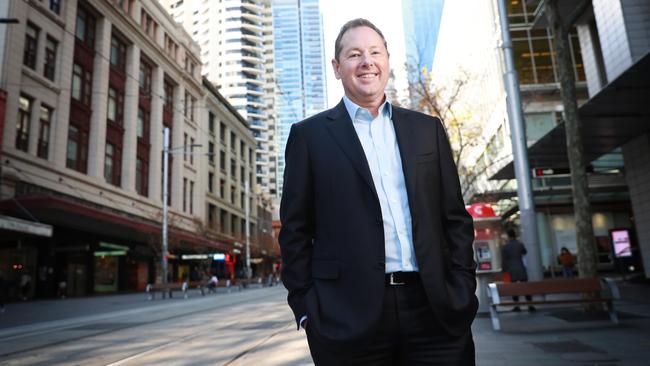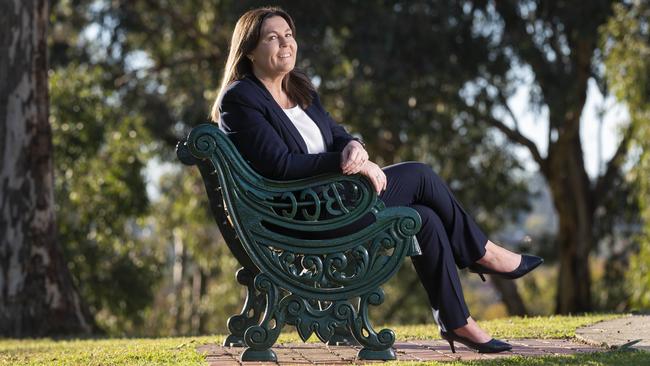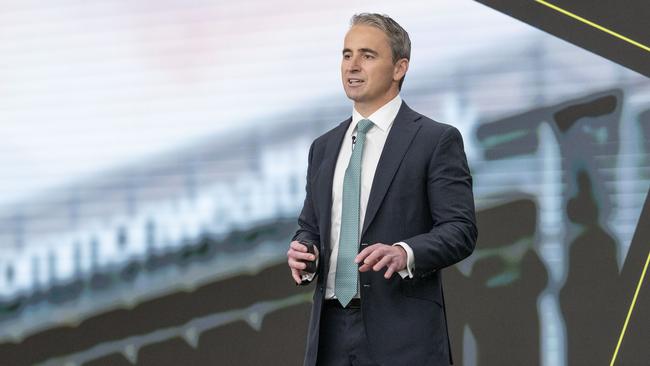The Australian’s 2022 CEO Survey: Bosses shift their message on working from home
The Australian’s 2022 CEO Survey reveals increasing concerns about the impact staying away has on culture, skills and mental health.

The value of working from work, not home – collaboration, communication, skills, culture and mental health has been called out by business leaders in The Australian’s 2022 CEO Survey.
This is a distinct shift in messaging on working from home, despite the labour shortage that favours employees in the jobs market.
READ THE FULL SURVEY:
AGL to Bunnings
CBA to HESTA
IAG to Nufarm
Officeworks to Sydney Airport
Tabcorp to Xero
“In 2023 we will be firmer on asking our people to work together in person for the majority of their work week,” said Tabcorp chief executive Adam Rytenskild. “I think human connection and team connection is important.”

“You cannot build a culture over the internet,” added Dexus chief executive Darren Steinberg. “At Dexus, we have seen a definite improvement in productivity since more people are back to the office.”
Cbus chief executive Justin Arter predicts the hybrid work balance will shift back towards the workplace. “We are all social creatures and work is a social activity. People are rediscovering the power of collaboration and the strength of building trust in person,” he said.
Mr Arter said the challenge for leaders was to build an environment that makes people want to return to the office.
To be clear, most business leaders accept that for white collar workers hybrid work is entrenched in the workplace. To a leader, they stress they still offer flexibility to employees. This has not changed from 2021.
New however, is that CEOs are vocal on the issue rather than sitting out the debate or moving the working from home decision process to a team level.
Last year’s uncertainty and the psychological toll of lockdowns on the workforce left most too gingered to speak out on the downside of WFH. Today, employee wellbeing is a reason to come back to the office.
“Our business has been built on connection, community and relationships; being together is important to us,” said Bendigo & Adelaide CEO Marnie Baker. “The wellbeing of our colleagues is a key consideration here. Being able to actually see and connect with our people ‘in real life’ is a very important way of showing you care and ensuring your team members are actually doing well.”

At building materials manufacturer Brickworks, Lindsay Partridge says most jobs are in production plants or sales roles and working from home is impractical. “We believe a collaborative workplace culture is best fostered through our office employees being on site,” he said.
Some of the biggest businesses report an increased willingness of workers to come back to the office.
“We continue to see increasing numbers of team members in our offices each month,” said Commonwealth Bank’s Matt Comyn. “The workplace plays an important role in facilitating connection, innovation, culture, career development and the ability to build and strengthen relationships.”

Qantas chief executive Alan Joyce says he is seeing business travel increase, indicating a move away from Zoom calls. He said the airline was a big believer in the value from having people in the office.
“It’s everything from the ability to get together to solve an issue quickly to the incidental insights you get from corridor conversations. You just don’t get that working from home all the time,” he said.
The productivity question on working from home remains vexed. Darren Steinberg at Dexus was one of only a few to call out a clear productivity gain in a return to the office. Most left the productivity debate to academics.
In September 2021, the Productivity Commission’s report into working from home – perhaps unsurprisingly – could offer little measurable evidence on productivity from the changes.
It said WFH was a lockdown induced forced experiment, the outcome of which was expected to be positive and advised governments to smooth rather than impede a shift to hybrid work.
An update on that view can be found in an interim report of the PC’s inquiries released in October. No additional research, however, was reported.
“The pandemic illustrated that large shares of the workforce could work from home effectively, giving them flexibility, cutting commuting times and for many, increasing their productivity,” it reads.
However, it noted that WFH for many businesses is a necessity imposed by restrictions, rather than a new mindset about how to organise their workforces.
The PC said enterprise agreements would begin including hybrid working policies, a change that could motivate greater interest in using the deals.
Telstra has chosen to do exactly this.
“We know our people are at their best when they have choice,” Telstra chief executive Vicki Brady said in her response to The Australian’s 2022 CEO Survey. “There is no talk of returning to previous ways of working at Telstra – we don’t waste time debating who should be in the office and when. We are all-in on hybrid. For us work is a thing you do not a place you go.”
From the get-go, NIB’s Mark Fitzgibbon has been a champion of WFH.
“Today, we pay our people a working from home allowance, recognising we’re not only hiring their homes as an office but we’re saving a lot of money in office space. We’re sharing the productivity gain,” he said.
While the survey reveals a genuine change in thinking at the top, there remains a sizeable group of white collar businesses where the message is still a general one around workplace flexibility and hybrid, including the big four consultancy firms.
But the important take-out from this survey is that – more and more – CEOs are realising that too many days working from home is eating away at their workplace culture, often at an intangible level that cannot be measured easily.
Brookfield’s Stewart Upson said the firm’s overarching philosophy remains that it is an office-first culture. “We believe that is where we collaborate and perform at our best. It’s also important for real-time training and mentoring, managing risk and building culture,” he said.
“Post Covid-19, hybrid working is here to stay,” said AGL Energy chief executive Damien Nicks. “However, we do think that extended work from home arrangements have had a negative impact on engagement and connection in some areas.”
“Since we introduced ‘anchor days’ in the office, we have experienced an increased level of engagement and excitement in the workplace. This has been great,” he said.
